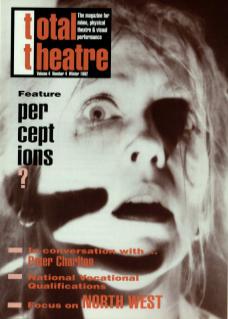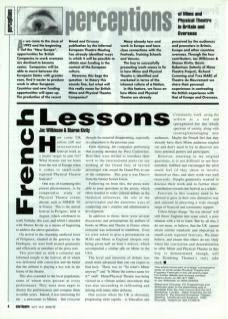How come UK artists still see international festival work as a major target to aim for? What lessons can we learn from the rest of Europe when it comes to small-scale regional Physical Theatre festivals?
One way of examining this potent phenomenon, is by comparative study of Physical Theatre events abroad, such as Mimos 92 in France. This is the annual festival in Perigueux, held in August, which celebrated its tenth birthday this year, and which I attended with Sharon Kivity as a means of beginning to address the above questions.
On arrival in the charming medieval town of Perigueux, situated at the gateway to the Dordogne, we were both treated graciously and efficiently as members of the press core.
This provided us with a colourful and informed insight to the festival, all of which was delivered with conviction and the belief that the artform is playing a key role in the future of the theatre.
This also extended to the local population, some of whom were present at every performance. They were most eager to discuss the performances and compare them to earlier years. Indeed, it was interesting for me – a newcomer to Mimos – that everyone thought the material disappointing, especially in comparison to the previous year.
Each morning, the companies performing that evening attended the Press Conference. Here they were invited to introduce their work to the international press, to say nothing of the Grand Jury of invited personages who award the Grand Prix to one of the companies. This year the winner was Derevo from the former Soviet Union.
Following on from this, the press were able to pose questions to the artists, which often resulted in wider cultural debate on the theatrical influences, the role of the artist/creator, and the numerous ways of conducting one's creative and administrative development.
In addition to these, there were several discussions and presentations by authors of books on Mime and Theatre in France where everyone was welcomed to contribute. Even we were asked to give a presentation on MAG and Mime in England (despite only being given half an hour's notice), which accompanied a similar talk on Mime in the USA.
The level and intensity of debate was much more advanced than one can expect to find here. There was no ‘So what's Mime anyway?’ and ‘Is Mime the correct name for it?’ at all. Mime / Physical Theatre was being viewed as a vibrant artistic movement that was also succeeding in infiltrating and mixing with many other artforms.
One avenue where the UK is obviously progressing more rapidly is Education and Community work, using the artform as a tool and springboard for the whole spectrum of society, along with creating/encouraging new audiences. Maybe the French feel that they already have their Mime audience singled out and don't need to try to discover any more potential punters and participants.
However, returning to my original questions, it is not difficult to see how enriched, fulfilled and encouraged the artist could feel (if they chose to involve themselves thus, and their work was well received). People genuinely wanted to discuss their work and to further their contribution towards the festival as a whole.
Festivals in this country need to be allowed to grow in their own distinctive way and succeed in attracting a wide enough range of financial and community support.
Unless things change the ‘trip abroad’ will still throw England into scant relief: a poor relation with a lot to learn. But by all this, I do not mean, or believe that the UK cannot attain similar standards and objectives in small-scale regional festivals. We must believe, and ensure that others do too. Only when the conviction and determination to offer Mime and Physical Theatre in this way is demonstrated enough will the Doubting Thomases truly take stock.
This article forms part of a larger comparative study of small-scale Physical Theatre and Puppetry Festivals in the UK and Europe. EC Programmes and Schemes open to the performing arts is available from the Arts Council and the ICA Bookshop, London. Other enquiries can be directed to the informal European Theatre Meeting.

